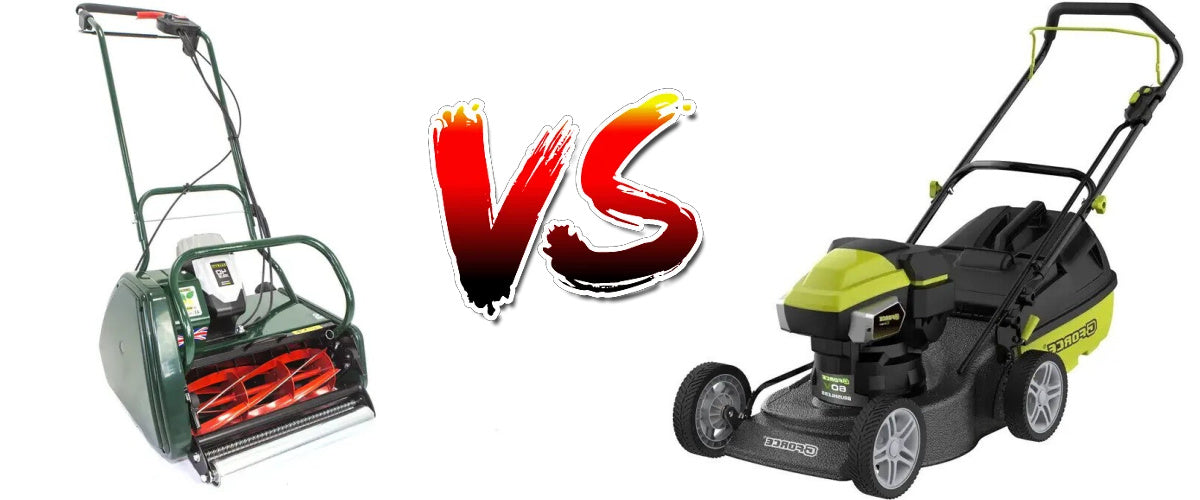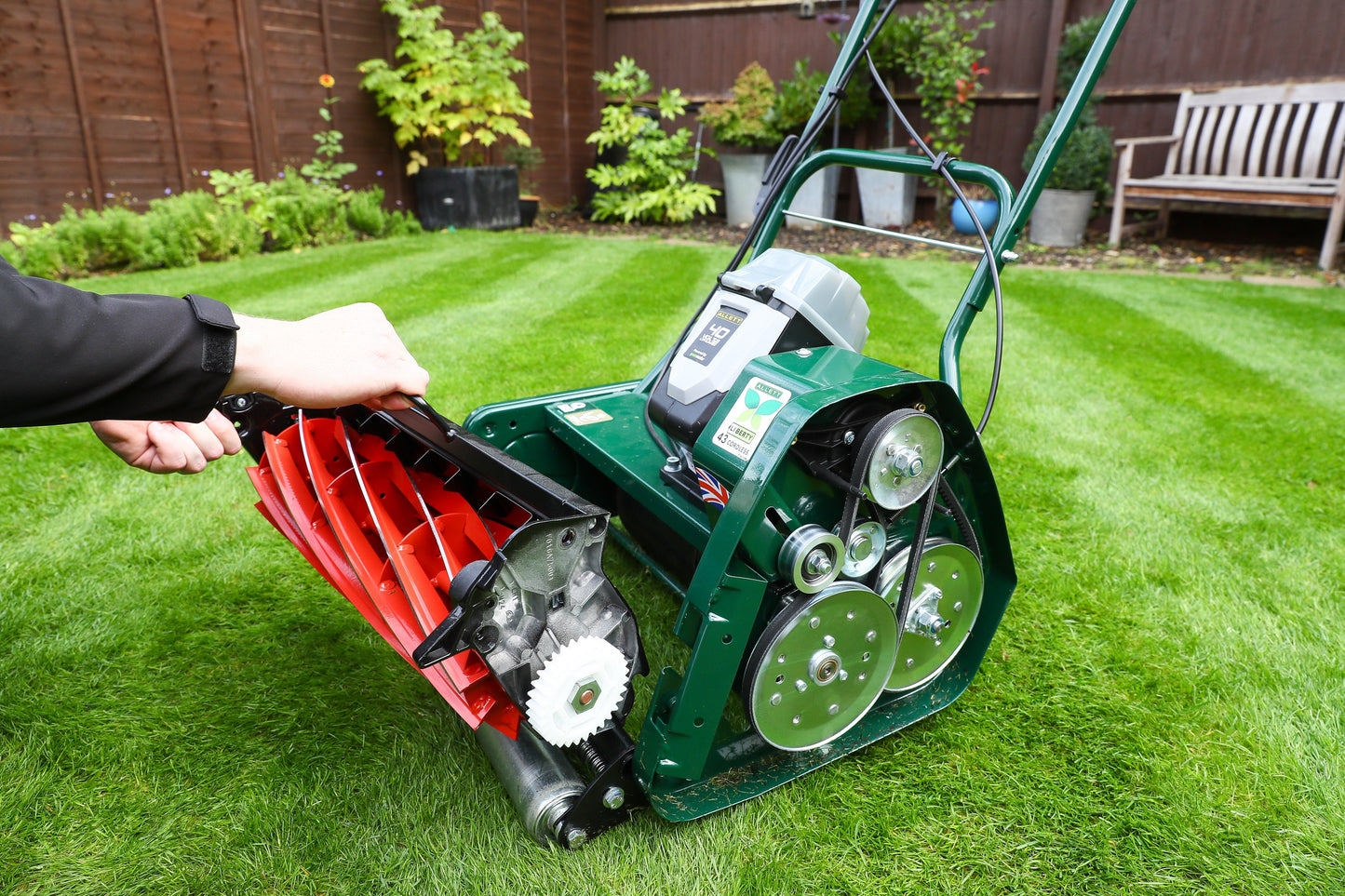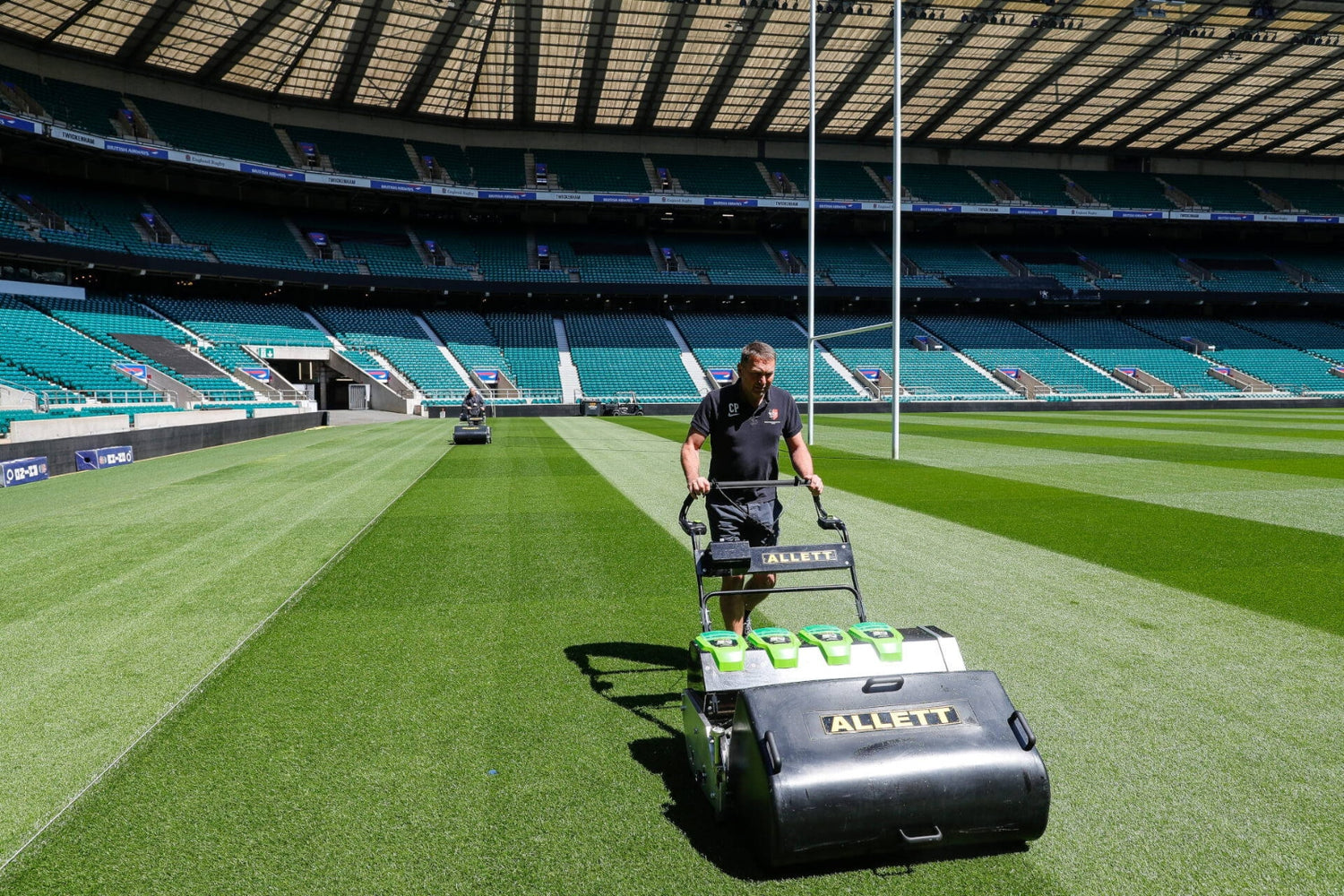1800 646 543

Cylinder Mowers vs. Rotary Mowers: Choosing the Right Mower for Your Lawn
Rotary mowers are the machines that most Aussies think of when they hear of a lawn mower. It’s no surprise most Aussies still believe the lawn mower was invented in Australia with Victa Richardson’s 1952 rotary invention. However, lawnmowers have been around LONG before then. Turns out, the first lawn mower was a cylinder mower invented in England by Edwin Budding in 1830.

Image Source: https://lana2594.wordpress.com/2015/02/13/1830-sewing-machine/
Who knew? Sorry, Victa—you’re still a legend in our books, though!
Four decades after Budding’s cylinder mower invention, Elwood McGuire, an American, came forward with the idea of the rotary lawnmower. And so, the evolution began. These lawnmowers have advanced significantly, leading us to today's debate: cylinder mowers or rotary mowers, which is the right mower for your lawn?
Let's break it down from the ground up.
What Are Cylinder Mowers and How Do They Work?
A cylinder mower, sometimes called the reel mower, has a set of five to 12 exposed cylindrical blades that rotate vertically to shear grass against a fixed blade, similar to how a sharp pair of scissors cut paper. The cutting edges point outwards and rotate past a fixed counter blade. As you push the mower, its spindle rotates past the fixed counter blade without touching each other.

As each cylinder blade (also known as reel blade) rotates, the grass gets trapped between the cylinder blade and the stationary blade at the base - in a scissor-like action. Cylinder mowers cut grasses between 35mm to 2mm in height.
While they are little known here, cylinder mowers are almost everywhere in the West - especially in the US, where the "formal lawn" is quite popular, and the cylinder landmower already has a market valuation of around $60.9 billion.
Advantages of cylinder mowers
Cylinder mowers don't just cut the lawn exceptionally gently. They also have several other advantages:
- Cylinder mowers’ blades cut grass deeper, which is ideal for well-manicured lawns with neat finishes.
- They provide a scissor-like no-damage cut, which is cleaner and healthier for grass.
- They work with reduced emissions and are very quiet—perfect for residential mowing on a Sunday or after work.
- Many hand-operated cylinder mowers are lightweight and easy to push and maneuver, especially on small lawns.
- Cylinder mowers (both manual and motor-driven) are easier to push than rotary mowers because of their streamlined, narrow designs.
- Fewer parts compared to rotary mowers, making them easier to maintain.
Disadvantages of cylinder mowers
Although cylinder mowers will impress first-time users with their clean cut and other advantages, they are sensitive. Cylinder mowers cannot cope with tall grasses, which is why you have to mow your lawn every week. If you want a real “English lawn,” you should mow the area two to three times a week.
After a holiday, two mowing sessions in a row are sometimes necessary to get the grass back to the right height.
Because the spindle and blade work together very precisely on cylinder mowers, they only work on lawns that are as low as possible. Also, there must be no foreign objects on the lawn. Branches and stones can get stuck in the precise mowing mechanism, bend the blades and cause dents - or worse. So, cylinder mowers are unsuitable for natural gardens or those with many trees. They're called formal lawnmowers for a reason.
Finally, the blades of a cylinder mower can only be resharpened by a specialist company. They require precise adjustments and specialised equipment to maintain their sharpness and alignment.
3 Top Cylinder Lawnmower Products
|
Mower Model |
Engine Type |
Features |
Ideal for |
Price |
|
Allett Kensington 20H 20" Honda GX120 Petrol Mower |
4-Stroke Honda GX120 Petrol Engine |
Precision cutting, rear roller for striping, high durability, 20-inch cutting width, moderate noise level |
Large residential and commercial lawns |
|
|
Gardena Hand Cylinder Lawnmower 400 |
None (walk-behind manual lawn mower) |
14-inch cutting width, 9 kg overall weight, quiet and smooth operation, grass deflector |
Small residential lawns |
|
|
Allett Liberty 43 Mower Only |
40v Lithium-Ion battery |
Cordless, 17 inches, medium noise level (92dB), eco-friendly, precision cutting |
Medium to large residential lawns |
|
|
MOW MASTER R18 Residential Series Cylinder Mower |
Commercial Honda GX 120 4hp Engine |
High quality, heavy duty construction. 18-Inch cutting width. dual clutch transmission, controlled weight distribution, soft touch drive leaver. |
Medium size residential lawns |
What Are Rotary Mowers and How Do They Work?
A rotary mower is a manual, battery-powered, or engine-operated lawn mower that uses a horizontally rotating blade to cut grass.
Rotary mowers work by constantly spinning horizontally mounted blades (two or more) at high speed, like the rotor of a helicopter.

As you push or drive the mower over the lawn, the rotating blade slices through the grass. The blade throws the grass clippings to the side or into a collection bag.
The distance of the blade from the ground determines the cutting height, while the length of the rotary blade determines the cutting width.

To increase or reduce the cutting height, you simply raise or lower the mower deck, which houses the blades and controls how far the blade is from the ground.

Advantages of rotary lawnmowers
I already mentioned the popularity of rotary lawnmowers in Australia. This is due to their versatility and low level of maintenance needed, pretty much a reason they're more common here:
- Rotary mowers can handle various grass types and landscape conditions, including uneven ground and lawns with numerous obstacles, better than cylinder mowers
- Most rotary mowers allow you to adjust the cutting height for different grass lengths and types, from short and neat to longer and more rugged.
- These lawnmowers also often come with side discharge features or collection bags that help manage grass clippings effectively.
- Rotary lawnmowers are also more affordable to acquire and maintain than cylinder mowers. Most top rotary lawnmowers are under $1,000 equipment.
Disadvantages of rotary lawn mowers
Every gadget with great benefits for humankind always has some not-too-pretty sides. The rotary lawnmowers have quite a few you should consider before investing in one.
- Most rotary lawn movers have large cutting areas which make them quite heavy.
- Rotary mowers have a higher risk of injuring the operator as the exposed blades are larger, move at high speed, and can propel stones or sticks.
- Rotary mowers’ blades tend to wear and break more as they endure high stress due to the high-speed rotation and contact with objects like rocks, sticks, or uneven ground.
- Without a mulching kit, rotary mowers can scatter clippings unevenly
- They don't cut as precisely as cylinder mowers, especially on long or wet grass. Also, they tend to shred and cause damages on the grass, especially when the blades are not so sharp.
- Rotary mowers - especially the motor driven ones - can be quite noisy—so loud, they might make you the star of your neighborhood’s “Most Likely to Disrupt Peace” award!
3 Top Rotary Lawnmower Products
|
Mower Model |
Engine Type |
Features |
Ideal For |
Price |
|
G-Force 60V Brushless Lawn Mower |
60V Brushless Motor |
Cordless, 18" cutting width, quiet operation, 50L grass catcher, easy start, low maintenance, weighing 27kg |
Small to medium home lawns |
|
|
Bushranger 46TK6IMSP Self Propelled Lawn Mower |
Kohler Courage XT675 engine |
18" (460 mm) Cut, 149 cc I/C engine, 5 Year Domestic Warranty, Weighing 31kg |
Medium to large residential lawns |
|
|
G-Force 201cc 21 Inch Hand Push Petrol Lawn Mower |
201cc HONDA 4-stroke engine |
21" cutting width, durable build, 60L grass catcher, Cutting height adjustment (25-80mm) |
Large home lawns |
Cylinder Mower vs Rotary Mower: A Side-by-side Comparison
When it comes down to choosing between cylinder mowers and rotary mowers, you’re not just picking a tool—you’re deciding the fate of your lawn. Next, I'll break it down by key factors and help you find out which one wins in your backyard!
Cut Quality: Cylinder Mowers or Rotary Mowers?
Cylinder mowers are the precision artists of the lawn-mowing world. Their blades work like scissors, giving your grass a clean, sharp trim with no tears. It helps create that perfectly manicured Royal Melbourne Golf Course look we all admire.
On the other hand, rotary mowers work with brute force and high speed —they slice through grass with a spinning blade. While they still get the job done, the cut is a little rougher, leaving the tips of the grass frayed, especially if the blades aren’t sharpened regularly.
Winner: Cylinder mowers
Impact on Lawn Aesthetics and Grass Health
If you’re after those lush stripes or a flawless green carpet, choose a cylinder mower. Their clean-cut technique reduces stress on the grass, keeping it healthier in the long run with no brown or yellow lawn patches. Rotary mowers, though, can be more forgiving on tougher grass and uneven terrain. But because their cuts are as clean, you might see more browning or fraying at the tips over time, which can impact the look of your lawn.

Winner: Cylinder mowers
Cylinder Lawn Mower vs Rotary Mower: Regular Maintenance Needs
Here’s where things start to shift… While cylinder mowers need a bit more TLC, rotary models tend to need more gear change.
First, rotary mowers are more DIY-friendly. As long as you keep the blade sharp (by grinding at a workshop or at home), and maybe give the engine a tune-up every now and then, you’re always good to go.
You also need to keep a cylinder mower’s blades sharp and aligned to maintain precision cut. You might even need a specialist to handle the sharpening. Thankfully, the blades of cylinder mowers, like the Allett Battery Mowers, don’t wear out like the rotary mowers. They are lighter so they can cut lower without picking up soil, stones, etc and dulling the blades.
Winner: Rotary mowers
User Experience with Both Types of Mowers
So, which one’s easier to use? I'd say, it depends.
If you enjoy a quiet, peaceful mowing experience or don't want to disturb the neighbours, the cylinder mower—especially the manual or battery-powered version—is whisper quiet and lightweight.
Rotary mowers on the other hand can get really loud. The petrol-powered ones are even louder, mostly over 90 decibels. Plus, their bulk can make them harder to push around. But if you have a large or uneven lawn, a rotary mower’s power and versatility might win you over, especially if you don’t want to spend all day mowing. This almost ended in a tie but the cylinder models nick it.
Winner: Cylinder mowers
Suitability for Different Lawn Conditions
Speaking of lawn types, cylinder mowers are best for flat, well-maintained lawns. A lot of them also use interchangeable cartridges, which allow for grooming, verticutting, dethatching, and aerating. What that means is you can have multiple machines in a cylinder mower. You just need to change out the reel for the required need.
Rotary mowers are also quite versatile too. If your lawn is bumpy or has tough grass, a rotary mower is the better option. They can work on taller grass, rougher ground, and even small debris without getting jammed. But the blades tend to get more wear and tears. So if your lawn is more jungle than park, the rotary mower might be your new best friend.
Winner: Rotary mowers
Rotary Mower vs Cylinder Mower: Initial Costs and Long-Term Value
Are cylinder mowers better than rotary models in the value-for-money department? It’s hard to say! Cylinder mowers, especially motor-driven models, can come with a hefty price tag upfront. Most top cylinder mowers come with digits in the thousands. The only reason your rotary mower might be that expensive is if it's a ride-on type like the G-Force 432cc.
Rotary mowers are usually more affordable upfront, mostly in the $500 to $900 range. Besides, they're easier to maintain, so they’re a solid choice if you’re looking for value without too much fuss. Meanwhile, a cylinder mower is always worth the investment if you want a professionally-cut or formal lawn. So, it depends!
Winner: It's a tie!
So, Which Is Better Cylinder or Rotary Lawn Mower?
Based on the comparison, the cylinder mower looks like the best value for money. But there is a place of what you value most—precision or power, finesse or flexibility. Both mowers have their strengths.
If you're anything like me, when you turn on the TV to watch a footy, cricket or golf game, you'll admire the perfectly striped and crisscrossed turf as much as the match play. So, how do they do it? The answer is cylinder mowers.

Image Source: https://allett-pro.com/products/allett-c34-evolution-cylinder-mower
Meanwhile, it's a different case if you have a not-so-smooth backyard lawn landscape at your residence. Also, if you don't have the time to do the lawn regularly during spring and winter, go for the rotary types. They're rugged, versatile and adjustable for different grass heights, and don't cost that much.
FAQs
-
Why is a cylinder mower better?
Cylinder mowers cut grasses cleaner and more precisely, for a well-manicured lawn that looks aesthetic and professional. These machines are the best option for lawns, turfs or courses with light and dark stripes. A cylinder mower doesn't scalp the grass, nor does the motion compact the lawn soil, thanks to the equalized weight dispersal.
2. Are rotary mowers better?
Overall, rotary mowers are not better than cylinder lawnmowers. But a rotary mower with a sharp blade is very efficient and sufficient for most home lawns. On the other hand, it's better than a cylinder type for rugged lawns with longer grass, numerous objects and uneven landscape.
3. Can cylinder mowers cut long grass?
Cylinder mowers work best on short, regularly mown grasses. They're not the best on lawns with long grasses. You may need to start with a rotary mower, and then continue consistently (twice a week) with a cylinder lawnmower.
4. Will a rotary mower cut wet grass?
For the sake of your lawn's health, don't cut wet grass with a rotary mower. You'll end up with jagged cuts. Besides, the wet grass clippings tend to clog the mower. This is more common in the rotary models, due to their fast spinning speed.
5. Are cylinder and reel mowers the same?
It depends. Quite often the terms will be used interchangeably. More accurately, a cylinder mower is a reel mower with the addition of a power source such as a petrol engine or battery powered motor. The terms "cylinder mower" is more common in the U.K., while "reel mower" is frequently used in the US. In the state of Western Australia, the term reel mower tends to be used universally.
Conclusion
At the end of the day, the best lawnmower for you comes down to the features of your lawn and your taste. If you value versatility and want a machine that works with uneven terrain, the rotary lawnmower is your best bet. Meanwhile, if you're a committed lawnie or homeowner who wants to take your lawn to the next level, you really can’t get there without a cylinder mower.
A cylinder or reel lawnmower is recommended for those who would like to dedicate more time, money, and effort for a showstopping, TV-perfect turf or lawn of the neighbourhood. These mowers don't just "hack" through the lawn but gently snip the grass without tearing it up.
Whichever path you choose, make sure you pick the mower that makes you look forward to mowing day.

